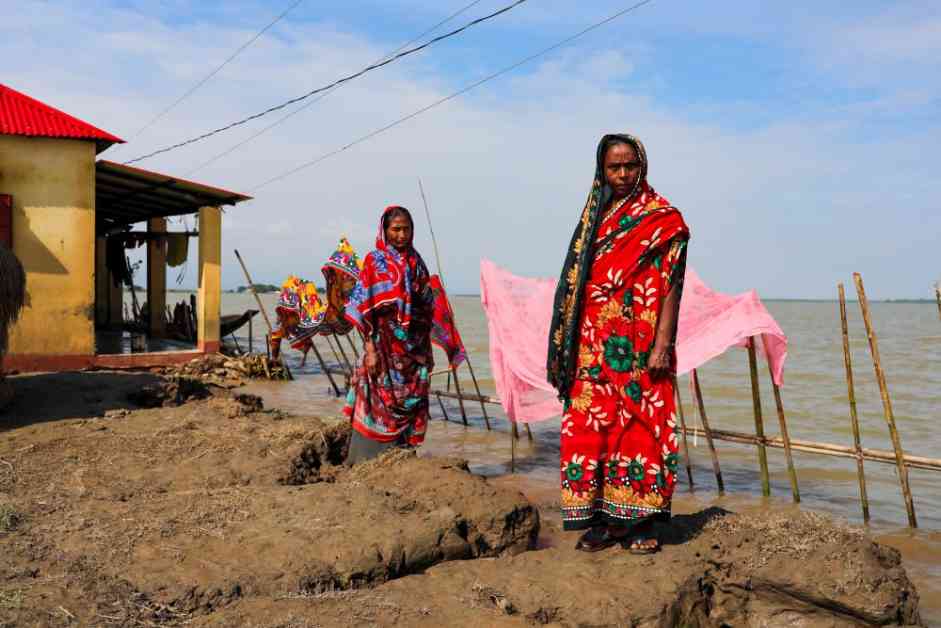Climate Change Driving Forced Labor Among Bangladeshi Migrants
Amid the devastating impacts of climate change in Bangladesh, a disturbing trend has emerged, revealing that almost all migrants from climate-affected regions are falling prey to various forms of forced labor. These individuals, who have lost their homes and livelihoods to cyclones and floods, are forced to migrate in search of work, only to find themselves ensnared in exploitative situations, perpetuating a vicious cycle of vulnerabilities. The International Institute for Environment and Development (IIED) recently published a paper highlighting this alarming reality, shedding light on the harsh consequences of climate inaction.
Ritu Bharadwaj, a principal researcher at IIED and co-author of the paper, aptly described modern slavery as a “cost of inaction” rather than a direct outcome of climate change itself. She emphasized that the absence of climate-resilient infrastructure and social safety nets is pushing climate victims to leave their homes in a state of distress, making them easy targets for exploitation.
Impact of Climate Change on Bangladesh
Bangladesh stands as one of the world’s most climate-vulnerable countries, grappling with a surge in extreme weather events that have multiplied disasters from an average of four per year between 1960 and 1990 to seven per year between 1991 and 2022. The rise in flash floods, sea-level encroachment, and salinity intrusion into farmlands and water sources has uprooted communities, leaving them without viable means of sustenance. This dire situation forces many households with meager incomes and fragile social safety nets to sell their belongings and migrate in a last-ditch effort to support their families.
According to IIED’s research, interviews with dozens of migrants and surveys of nearly 650 households in Sylhet and Pirojpur districts revealed distressing statistics. A staggering 70% of households reported at least one family member migrating either within Bangladesh or to Gulf countries in search of work. Shockingly, 92% of internal migrants and virtually all overseas migrants encountered various forms of forced labor, including wage withholding, physical violence, restricted mobility, and debt bondage.
Urgent Need for Social Protection
Experts warn that the displacement crisis in Bangladesh is spiraling due to the compounding effects of climate change. Sea-level rise is rendering low-lying areas uninhabitable, compelling mass migrations to cities like Dhaka. Disasters have displaced millions internally over the past decade, with projections estimating up to 19.9 million people internally displaced by 2050. This escalating crisis underscores the urgent need for social protection measures to mitigate migration pressures.
Chiara Soletti, climate change advocacy manager at Anti-Slavery International, emphasized that the distress-driven migration underlines the heightened risks of exploitation and modern slavery. She pointed out that a lack of global support systems, limited alternative income opportunities, unsafe migration pathways, and inadequate human rights protections along migration routes contribute to the proliferation of modern slavery. Thus, modern slavery should be recognized as a non-economic loss and damage caused by climate change, stripping individuals of their dignity and violating their human rights.
In response to these harrowing revelations, IIED advocates for bolstering social protection measures in Bangladesh to support communities before, during, and after migration. Investments in climate-resilient infrastructure, skills development programs, anticipatory cash transfers, and food aid can help diversify incomes and reduce the need for distress migration. Furthermore, formalizing and regulating overseas job brokers, educating migrants about their rights, and establishing migration helplines in Gulf States are crucial steps to ensure safer migration routes and protect vulnerable individuals from exploitation.
Hafij Khan, a Bangladeshi climate negotiator, highlighted the importance of leveraging international climate funds to expand social protection efforts and address migration challenges in Bangladesh. However, he stressed the need for the government to gain a comprehensive understanding of the communities’ social protection needs to implement effective support systems. As IIED’s research lays the foundation for addressing the intersecting issues of climate change and forced labor, the path forward entails strategic interventions that prioritize the well-being and rights of vulnerable migrants in Bangladesh.













![Local Residents vs. Solar Farms: Community Opposition in [County Name] local-residents-vs-solar-farms-community-opposition-in-county-name](https://ctenews.com/wp-content/uploads/2024/12/local-residents-vs-solar-farms-community-opposition-in-county-name-324x160.jpg)
